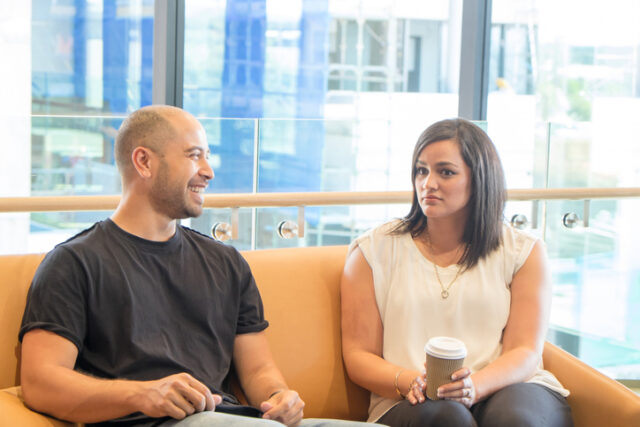Turning 40 can be a bit of a wake-up call—in the best way.

You don’t need to have everything perfectly figured out—that’s unlikely, anyway—but by this stage, there are certain life skills that make everything run a little smoother. These aren’t flashy achievements or things you’d put on a CV—they’re the behind-the-scenes abilities that help you protect your peace, set your boundaries, and live more on your own terms. If you’ve not quite nailed these yet, now’s the perfect time to start.
1. Knowing how to say no without guilt

Saying “no” is more than just being assertive—it’s knowing your limits and valuing your time. By 40, most people have stretched themselves thin enough times to realise that pleasing everyone is a losing game. Learning to say no with kindness, but confidence is a major life upgrade. That doesn’t mean becoming selfish—it means becoming honest. You don’t owe your time or energy to everyone who asks for it, and learning to protect both is a sign you’ve got your priorities straight.
2. Managing your money like a grown-up

You don’t have to be an investment guru, but having a basic handle on your finances matters. That means knowing what’s coming in and going out, having an emergency fund, and not relying on hope or guesswork to get through the month. If this still feels overwhelming, you’re not alone, but it’s worth tackling. Money stress adds up over time, and the sooner you feel in control, the easier life gets. Even small changes can make a massive difference.
3. Keeping your cool in hard conversations

By 40, you’ve probably had your fair share of awkward talks, emotional blow-ups, or misunderstood texts. At some point, it clicks that staying calm gets you much further than being reactive. Learning to speak clearly, listen properly, and hold space for discomfort is a serious life skill. It’s not about winning arguments—it’s about showing up with clarity and compassion. That combo is rare, and powerful, and it makes every relationship—personal or professional—work better.
4. Recognising when you’re the problem

Self-awareness is uncomfortable, but essential. If every situation feels like someone else’s fault, it might be time to look inward. The ability to pause, reflect, and admit, “I messed up,” is what separates real growth from just going in circles. Accountability isn’t about shame—it’s about progress. Owning your role in something doesn’t make you weak; it makes you mature enough to learn from it instead of running from it.
5. Letting go of what’s not yours to carry

At some point, you realise you don’t have to fix everything—or everyone. Carrying the emotional weight of every conflict, worry, or unresolved issue can quietly burn you out. Knowing how to step back, especially when something isn’t yours to solve, is powerful. This doesn’t mean you stop caring. It means you’ve learned where your responsibility ends. That clarity brings peace, and it helps you show up more fully for the things that actually are yours to deal with.
6. Feeding yourself like you actually like yourself

This isn’t about diets or meal plans. It’s about being able to consistently give your body food that fuels you—not just food that fills a gap or silences a craving. You don’t need to be perfect, but basic nourishment is a form of self-respect. Whether it’s planning meals, cooking at home more, or simply remembering to eat at all—how you feed yourself says a lot about how you treat yourself. By 40, you deserve meals that make you feel alive, not just functional.
7. Being alone without spiralling

Some people never really learn to enjoy their own company. But by 40, being comfortable alone is a game-changer. It means you don’t constantly need distractions, validation, or noise to feel okay. You know how to be with yourself—and that’s rare. This doesn’t mean isolation—it means independence. When you can be alone without falling apart, everything else starts to feel a bit steadier too.
8. Noticing the early signs of burnout

You might have pushed yourself to breaking point in your twenties or thirties, but now it’s about catching it before the crash. Learning to spot the subtle signs—irritability, mental fog, dread, disconnection—can help you intervene before you’re completely fried. Burnout doesn’t always show up with sirens blaring. Sometimes it’s just a slow numbness creeping in. Knowing when to rest, pull back, or ask for help is a skill that protects you long-term.
9. Keeping friendships alive without constant effort
 Source: Unsplash
Source: Unsplash At this stage of life, everyone’s busy—and that’s okay. True friendships don’t need daily texts or scheduled meetups to survive. The real skill is being able to check in when it matters, show up when it counts, and trust the connection even in the quiet stretches. Friendship maintenance becomes less about quantity and more about quality. You learn to let go of guilt and stay connected in ways that feel realistic rather than pressured.
10. Choosing rest over productivity guilt

If you’re still tying your worth to how much you get done in a day, this is your nudge to stop. Rest is not a reward—it’s a necessity. By 40, you’ve likely experienced what happens when you don’t take breaks. And it’s not pretty. Being able to rest without narrating a guilt spiral in your head is a learned skill. It means trusting that you’re valuable even when you’re not doing anything “useful.” That’s where real peace starts.
11. Understanding how you self-sabotage

Whether it’s procrastination, people-pleasing, or talking yourself out of things before you’ve even started—everyone has their version of self-sabotage. By 40, you’ve hopefully started recognising the patterns instead of repeating them on autopilot. Awareness here is key. Once you know how you get in your own way, you can start moving out of survival mode and into something more supportive—even if it takes time.
12. Knowing how to make a decision and stick to it

Endless second-guessing wastes so much time. The ability to weigh your options, make a choice, and move forward with it is underrated. By 40, decision fatigue hits differently—and clarity becomes a superpower. That doesn’t mean you’ll always get it right. But trusting yourself enough to try, learn, and adjust is more valuable than waiting for perfect certainty that never comes.
13. Creating your own definition of success

If you’re still chasing someone else’s version of a “good life,” now’s the time to stop. Success isn’t a checklist someone else wrote—it’s what feels good, real, and aligned with your own values. For some, that’s career. For others, it’s quiet evenings and close relationships. The sooner you get clear on what matters to you—not your parents, your peers, or social media—the more ease you’ll feel in your day-to-day life. Comparison fades once you know your own lane.
14. Not panicking when things go sideways

Life will keep throwing curveballs. The real skill isn’t avoiding chaos—it’s learning how to stay steady when it shows up. Whether it’s a job loss, a health scare, or a relationship wobble, knowing how to ground yourself in the middle of it is powerful. It doesn’t mean pretending everything’s fine. It means you’ve built enough inner resilience to take a breath, ask for help if needed, and remind yourself this isn’t the end. Just another plot twist.




